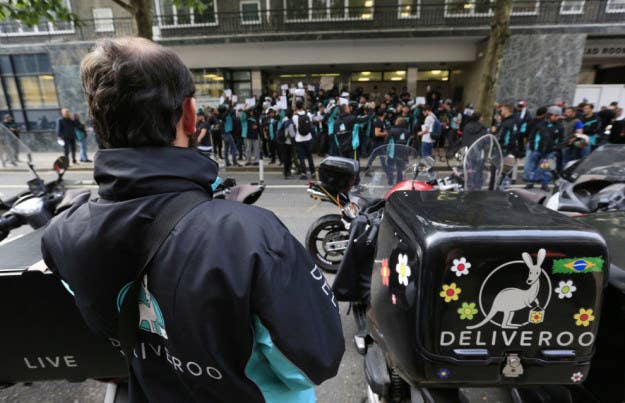
The Court of Appeal has ruled that Gary Smith, a man who worked for Pimlico Plumbers, should be entitled to basic "worker" rights, despite being classified as self-employed in his contract with the company.
The court said Smith, who worked solely for the London-based company for six years before he quit in 2010 when his request to go part-time after a heart attack was rejected, should have worker rights under law.
Being classified as a worker means his law firm, TMP Solicitors, can now bring a case to claim backdated holiday pay and can also bring a case to establish whether he was "discriminated against" in having been "dismissed", his lawyer Jacqueline McGuigan told BuzzFeed News.
The case follows a series of employment tribunals around the rights of workers employed on a casual or flexible basis as well as complaints by workers about companies including Uber, Deliveroo, and CitySprint.
The government has also commissioned a review into the modern world of work, and the business select committee is separately to begin its own inquiry into the same subject.
The legal arguments have focused on the classification of people at work because different employment classifications carry different rights.
A person with worker status has the right to the national minimum wage, holiday pay and certain protections – including against discrimination. People with employee status, meanwhile, have the most substantial level of rights and protection under the law.
Campaigners have pushed for a crackdown on "bogus self-employment", which is afforded the least rights.

Smith has been locked in a battle with Pimlico Plumbers since 2011, when an employment tribunal first found he should be classified as a worker.
His lawyer said the Court of Appeal's decision was the third time a court had ruled in Smith's favour following appeals by Pimlico Plumbers.
McGuigan said Smith's legal challenge, which was funded by the Equality and Human Rights Commission (EHRC), was "such an important case" and could have ramifications for businesses trying to "avoid" employment legislation.
However, Charlie Mullins, the founder and CEO of Pimlico Plumbers – who also backed the Article 50 legal challenge – told BuzzFeed News it was "highly likely" the company would appeal the latest decision, and called the law around workers rights a "grey area".
The company had, he said, "tried to accommodate" Smith's part-time work but had been unable to – a claim McGuigan said was "factually incorrect" in accordance with the evidence she had seen.
"He wanted to be employed on a self-employed basis," Mullins said. "Quite clearly he was self-employed but somehow now he wants the benefits of employment rights."
He added: "Nobody strangled Gary Smith to come on as self-employed, he approached Pimlico Plumbers. He was a great engineer and it was a shame to have lost him at the time, but he couldn't just do a job and disappear.
"He wanted to work three days and if a job was half done it would mean we'd have to use one of our other contractors to finish the job and that's not good business practice to work like that."
"It's just a shame it's come to this," Mullins added.
Mullins told BuzzFeed News that around two-thirds of his 350 staff were self-employed, but he did not think the ruling could impact his other workers, because Smith had found a "loophole" in the contract and now the contracts were "watertight".
Responding to the decision, law firm Irwin Mitchell said the ruling would have major repercussions for the way businesses such as Uber and Deliveroo operate in the future.
The EHRC said the judgment would "help workers who are incorrectly described as contractors by the companies they work for".
EHRC CEO Rebecca Hilsenrath said: "Companies will no longer be able to avoid their duty to provide workers with support such as sickness benefits.
“We are delighted with today’s ruling and hope that businesses ensure that they give proper contracts to people who should have worker status.”

